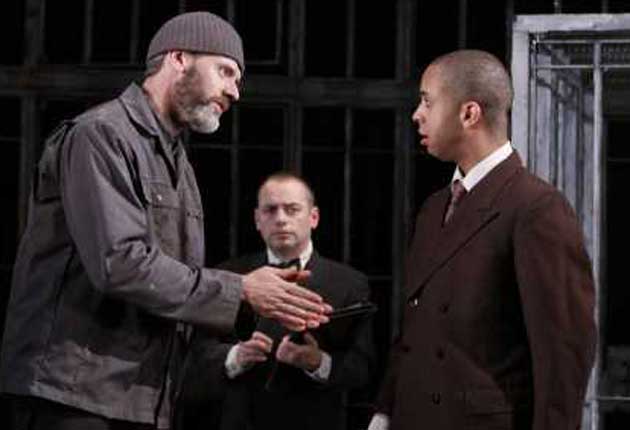The Merchant of Venice, Rose Theatre, Kingston

Your support helps us to tell the story
From reproductive rights to climate change to Big Tech, The Independent is on the ground when the story is developing. Whether it's investigating the financials of Elon Musk's pro-Trump PAC or producing our latest documentary, 'The A Word', which shines a light on the American women fighting for reproductive rights, we know how important it is to parse out the facts from the messaging.
At such a critical moment in US history, we need reporters on the ground. Your donation allows us to keep sending journalists to speak to both sides of the story.
The Independent is trusted by Americans across the entire political spectrum. And unlike many other quality news outlets, we choose not to lock Americans out of our reporting and analysis with paywalls. We believe quality journalism should be available to everyone, paid for by those who can afford it.
Your support makes all the difference.Denmark’s a prison in Hamlet and so too, now, is Venice in The Merchant. Edward Hall’s striking production for his all-male Propeller touring company looks good behind bars, creating a neutral setting of confinement and inquisition that suits the play surprisingly well.
The concept is not cluttered with framing the action: the characters emerge from the ranks, as though acquiring identities they hadn’t previously considered. So, Portia and Nerissa – a conspiratorial pairing of Kelsey Brookfield and Chris Myles – wear corsets and high heels as well as braces and chinos. The caskets are illuminated on a prison table, suggesting the outside “other world” of Belmont.
Portia is as much imprisoned by her father’s conditions of choosing a suitor as is Jessica (played as a jailbird skivvy in a headscarf by Jon Trenchard) by Shylock’s domestic tyranny. The racist stand-off between the moneylender and the Christians is highlighted in this environment, where feuds can fester; Richard Clothier’s Shylock gathers force in isolation, turning violent in “Hath not a Jew eyes…” and showing finally that if you live by the letter of the law you may perish by it, too.
“Which is the Christian, which the Jew?” is Portia’s question in the courtroom scene, where Bob Barrett’s puzzled Antonio, his fortune lost at sea against all odds, is helplessly incarcerated. The same question is asked at the top of the play, establishing the idea that we exist in thoughts and deeds, not appearances. Those who insist on outward show – such as the vainglorious suitors of Morocco and Aragon, hilariously played by Jonathan Livingstone and Thomas Padden – pay a price.
Michael Pavelka’s design of a three-tiered prison with mobile cages and basic furniture, cunningly lit by Ben Ormerod, allows for shape-shifting fluency in performance, the cast of 14 humming and joshing in the background when not focused centre stage.
It’s not fashionable to think of The Merchant as one of Shakespeare’s greatest plays, but I think it is, and its qualities of mercy, as well as humanity, tolerance and friendship, stand out in a fine relief in this inspired, intelligent revival. And the female roles reverberate more fully for being played by boys, for whom they were written.
At the Watermill, Newbury, 4 March to 2 May; at Cheltenham, Salford and Oxford in June www.propeller.org.uk
Join our commenting forum
Join thought-provoking conversations, follow other Independent readers and see their replies
Comments